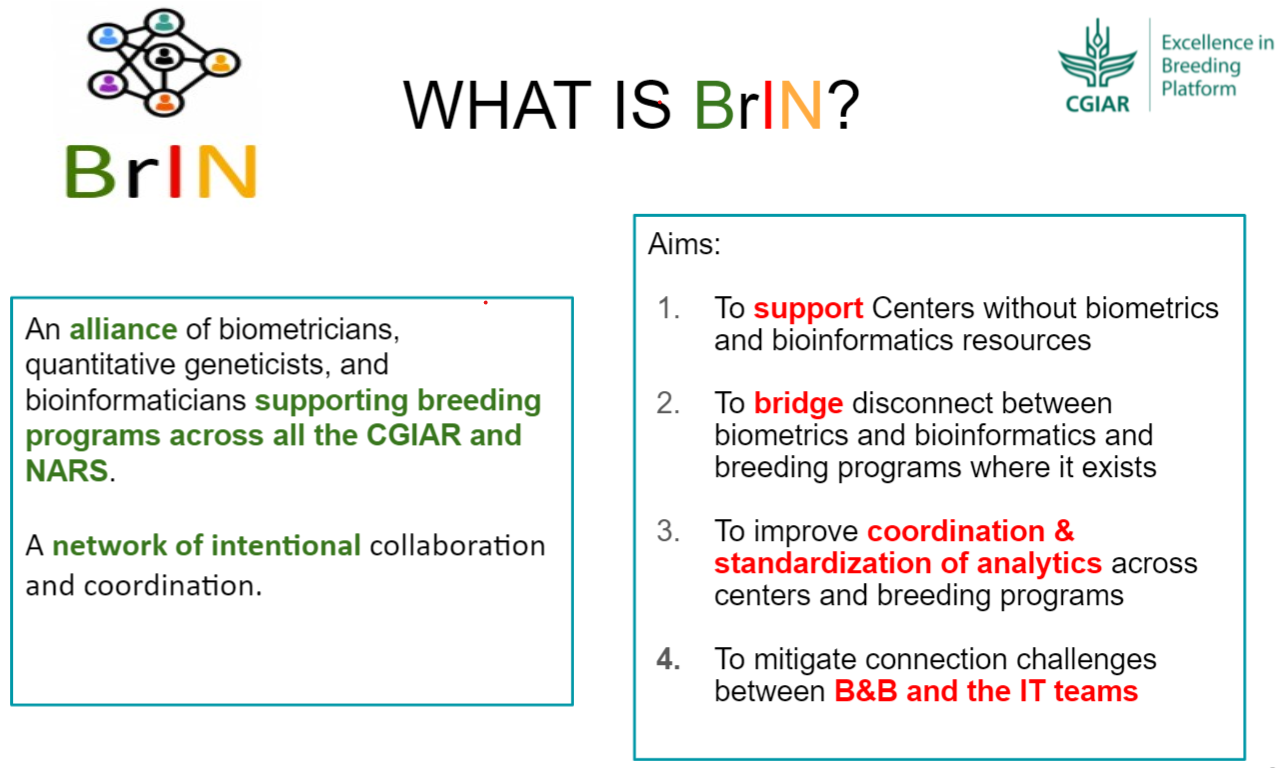WHAT IS BrIN?
The Breeding Informatics Network (BrIN) is an alliance of biometricians, bioinformaticians (B&B), and geneticists supporting breeding programs across the CGIAR.
This group coordinates to set up CGIAR-wide standards in analytics and decision support for all crops, and implements best practice analyses supporting breeding programs. BrIN determines best practices through small, focused network groups. In coordination with CGIAR Excellence in Breeding (EiB) module leadership, BrIN aligns their work with breeding programs and their continuous improvement goals.
The network groups also coordinate the best practices and processes implemented in the Enterprise Breeding System (EBS) Breeding Analytics and Services platforms. They partner with the EBS development team in validating the implementation in EBS and also share the same standards with Breedbase and BMS etc. partners.
BrIN is facilitated by EiB's Breeding Informatics module. EiB aims to accelerate the modernization of CGIAR/NARS breeding programs to increase the rates of genetic gain and shorten the cycle of varietal development and product replacement.
BACKGROUND:
Biometrics and bioinformatics resources are unevenly distributed across CGIAR and NARS centers. Some centers lack resources and need support. Additionally, even when resources exist, the connection between B&B and the breeding programs can be strengthened. Better resources and connections can result in improved experimental designs, data analytics, and decision support, ultimately positively impacting genetic gain and the development of better adapted varieties.
Collaborations across biometrics teams across centers are not always routine. This results in a lack of coordination and standardization of analytics across Centers and breeding programs, making it challenging for the donors to monitor the progress against the BPAT (Breeding Program Assessment Tool) recommendations and returns on investments.
The interactions can be strengthened between biometrics and bioinformatics teams and the IT implementation teams who are building systems and tools for data management and analytics. This close interaction is critical to reduce wasted efforts or miscommunication since multi-dimensional data and information are needed to arrive at Best Practices and implement them into software solutions.
GOALS:
As a network of collaboration and coordination, BrIN aims to:
-
Increase engagement among members of the network, forming a network of co-working community that solves common problems together
-
Ensure Best Practice recommendations and standards are set for all major decision points in the breeding cycle for all crops supported by the Crops to End Hunger (CtEH) initiative.
-
Implement Best Practice recommendations in EBS Breeding Analytics
-
Implement Best Practice analytics in breeding pipeline decisions
OUTPUTS & OPPORTUNITIES:
Over time, BrIN will offer and facilitate opportunities and outputs such as:
-
Outputs:
-
Network group plans to align with breeding program continuous improvement plans and individual member’s work plans
-
Best Practices and processes are recommended and reported in standard requirement templates and SOP documents
-
These requirement templates and SOPs feed into EBS product backlog and prioritized for target release versions
-
These standard documents turned into model parameter files for consumption into EBS Breeding Analytics
-
Best Practices applied in breeding decisions and adopted in breeding process which BrIN members are integral to the the training and adoption activities
-
Connect with domain experts and integrators across Centers, programs, disciplines, public and private partners
-
Trainings, webinars, networking events
-
Resources
RESOURCES:
-
Platform: Enterprise Breeding System (EBS)
2021 EVENTS:
BrIN learning series webinar:
- BrIN Learning Series
- ASReml-R Workshops-Introduction Workshop Attendee List & Testimony tracking
BrIN main team updates
Bimonthly sprint cycle via weekly updates within each of the four sub-teams:
- Team 1: Genetic Gains-Experimental Designs-Mixed Models
- Team 2: Advancement and Parental Selection Decision Support
- Team 3: Genomics Selection Application
- Team 4: Marker-Based Decision Support
QUERIES: Young Wha Lee (EiB): Y.W.LEE (a) cgiar.org / Star Yanxin Gao (Cornell): yg28 (a) cornell.edu


